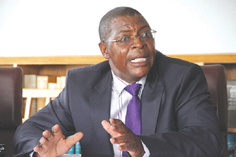



BULAWAYO — Rifts between the two formations of the Movement for Democratic Change (MDC) have widened, further squandering any chances of a reunion before forthcoming polls.
The once united opposition split in 2005 over the question of whether or not to participate in senatorial elections, resulting in two formations emerging: One led by Prime Minister (PM) Morgan Tsvangirai and the other led by Industry and Commerce Minister, Welshman Ncube.
Ncube’s grouping later invited Deputy Prime Minister Arthur Mutambara to be their leader, but the two fell out following a 2011 congress in which the latter lost leadership to the former.Mutambara now leads a renegade group that has chosen to stick with him even though they do not have a constituency of their own.But as polls draw nearer, PM Tsvangirai and Ncube have been under pressure to present a united front against President Robert Mugabe to increase their chances of dislodging him from power to end his 33-year-old reign.
Previous unity talks between Tsvangirai and Ncube’s formations collapsed due to mistrusts.
But in a no holds barred conversation with her party’s members and friends on Facebook recently, the secretary-general of the Ncube-led formation, Priscilla Misihairabwi-Mushonga, das-hed hopes of reuniting with the premier’s party ahead of forthcoming polls.
“Last night I kept thinking about this big numbers thing and I realised that I would rather be living in a small room in Makokoba with a husband that respects me, who is a real father to my children, than be in a mansion in the Brooke driving a Mercedes Benz whilst hiding a blue eye under Gucci sunglasses; if 2005 happened again today I would still choose to be with the same group,” wrote Misihairabwi-Mushonga.
“These last few years in government (have) done one thing for me; I am convinced that at this time no party provides me the space to do the things I am most passionate about than this MDC.”
During the life of the eighth Parliament, the two MDC formations have largely cooperated in the legislative assembly but such unity has ended there.
The decision to close ranks by MDC in Parliament ensured that ZANU-PF lost the speaker’s post for the first time in 2008 to the MDC-T’s Lovemore Moyo and in another rerun of the top legislative post two years later, the presiding officer was retained after the Supreme Court had ruled that the initial voting was not free and fair.
However, outside Parliament the two parties have failed to put aside their differences, with Tsvangirai and Ncube at some stage trading insults.
Apart from her opinion on the MDC-T, Misihairabwi-Mushonga said their decision to invite Mutambara to lead them after the split was a mistake. She added that they had not settled on senior party members such as Ncube or the late Gibson Sibanda at the time because they did not want to fuel perceptions that the split was about a leadership contest.
“We again wrongly believed that an outsider untainted ‘by the split’ would be more acceptable. We were obviously wrong and I personally take full responsibility for the role I played in persuading and advocating for that position. I guess not all that glitters is gold; some of us had the nostalgia about how he had been at the centre of the student movement, in challenging the one party state thinking. I guess real politics is different,” she added.
Meanwhile, the shielding of the top brass of the MDC-T in primary elections has cast fresh spotlight on the party’s commitment to internal democracy.
Political observers now contend that the MDC-T was slowly morphing into an authoritarian movement.
In the four years that the party has been in government, observers have accused PM Tsvangirai’s party of losing touch with its grassroots structures and joining the gravy train.
Now, the move to shield the party’s bigwigs has come at a heavy cost.
It has fuelled perceptions of the rise of invincible elites backed by their political connections, the flouting of the party’s constitution and the sidelining of deserving candidates for political expediency.
“It has fractured internal democracy. The party’s constitutional guideline outlines the need for holding of open and transparent primary elections,” said Trevor Maisiri, a senior analyst at the International Crisis Group.
“By defying that constitutional tenet the MDC-T is falling for the temptation of unilateralism, politics of individual invincibility and the failure to uphold internal democracy. This will create a lineage of sacred cows that will always have more rights than the ordinary members.”
In the Matabeleland province, Gorden Moyo, the MDC-T Bulawayo provincial chairperson and Lovemore Moyo, the party’s national chairperson, have reserved the right to stand in their constituencies without any challenge.
Gorden Moyo will stand in the Makokoba constituency, after the pulling out of Deputy Prime Minister Thokozani Khupe, while Lovemore Moyo resisted a challenge from Watchy Sibanda for the candidacy of the Matopo constituency.
Moyo has been the Member of Parliament for Matopo since 2000 and said his constituency could not be put up for a primary poll as he had the endorsement of the MDC-T’s national executive council — its highest decision making body — to stand as the party candidate.
“We are very clear as the MDC-T and our national policy stipulates that anyone can contest at any level. We, however, also have obligations, which are clear and that is when considering selection of candidates, the rule of seniority applies,” said Moyo.
The MDC-T has twice postponed holding primary elections to pick candidates to stand in the harmonised elections, which President Robert Mugabe wants held by the end of next month. With the possibility that elections could be held soon, the MDC-T is under increasing pressure to stave off the ZANU-PF offensive. It is understood that the MDC-T hopes to put up a fight with an intact top brass — familiar with ZANU-PF’s plots and machinations.